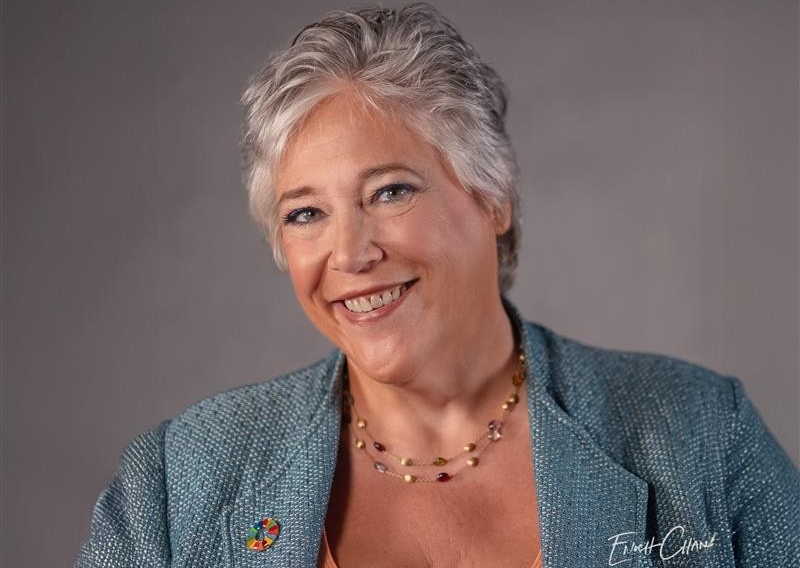Nichola Dyer’s path to global sustainable change — and the seaweed innovation that drives it
 “I believe in staying engaged where I can make a difference with my alma mater.” | Photo: Enoch Chan
“I believe in staying engaged where I can make a difference with my alma mater.” | Photo: Enoch Chan
Nichola Dyer, BA 85, brings a global perspective to sustainability and economic development, forged through decades of high-impact work around the world.
Born in England and raised on Montreal’s South Shore after immigrating to Canada at age six, Dyer was part of the first cohort of Co-op students in economics at Concordia.
The holder of a master’s degree in economics from the University of Illinois at Urbana-Champaign, she is the founder and CEO of NJDyer Global Advisory and senior advisor to the Global Seaweed Coalition — two roles that reflect her commitment to inclusive, sustainable progress.
Based in Washington, D.C., Dyer spent 26 years with the World Bank, where she led initiatives spanning ethics, equity and economic development. She helped launch the Bank’s first operational engagement on disability inclusion, managed the $1.5-billion Global Agriculture and Food Security Program and oversaw the establishment of the institution’s office in Gabon.
Her work continues to centre on impact. She chairs an education grant program for women from the Global South, sits on the board of a theatre company and helps lead equity, diversity and inclusion efforts as a member of the Concordia University Alumni Association board.
Dyer has also remained a generous supporter of Concordia students — including through a $25,000 gift in 2024 to enhance the scholarship she established for Department of Economics students in Co-op, bringing her total giving to $64,000.
This past July, she moderated high-level events at the United Nations Ocean Conference in Nice, France — including one in the Blue Zone, where UN member states meet — to raise awareness of seaweed’s potential to help achieve the Sustainable Development Goals.
In 2026, she will join an all-women scientific expedition to Antarctica as a policy liaison and communicator, helping bridge field research and global environmental policy.
“Too often in global development, we rely on jargon or imposed solutions,” says Dyer. “I’ve learned to listen first, communicate clearly and focus on where we can make the greatest difference — especially at the margins, where a little support goes a long way.”
Why is seaweed important for the future of our oceans and the planet?
Nichola Dyer: Seaweed is hugely undervalued despite its many benefits. Nutritionally, it offers rare elements like B12 — important for vegans — and is rich in protein and micronutrients. Yet it’s unfamiliar in much of the Western world.
It also has climate value. When added to cattle feed, seaweed reduces methane emissions, which is critical since agriculture accounts for a third of greenhouse gases. As a biostimulant, it can improve soil health, too.
In oceans, seaweed absorbs carbon dioxide, de-acidifies water and restores biodiversity. It’s also a raw material for biodegradable plastics, sustainable textiles and pharmaceuticals. All of this makes it a powerful — and overlooked — ally for climate and ocean health.
What drew you to international development and the World Bank? What did you enjoy about the work?
ND: I had no formal background in international development. My personal life led me there — I married someone from Africa. At the time, I was working in KPMG’s economics group but wanted to do something less profit-driven. My then-husband encouraged me to apply to the World Bank.
I got my start in the Young Professionals program. My first permanent job was as country economist for Gabon. After two visits, I suggested a permanent presence there. Senior leadership agreed — and what was supposed to be a short posting turned into more than four years.
Gabon was small enough that I could see the results of my work. That taught me a key lesson: real development happens when countries lead their own agendas.
How did your time at Concordia shape your path?
ND: Concordia gave me both opportunity and encouragement. The Co-op program provided important work experience. I also had a part-time job typing academic papers and hosted a radio show on campus — both helped me financially and creatively.
One professor, my faculty advisor who later became a close mentor, urged me to consider graduate school. That changed my life.
What inspired you to give back to Concordia as a donor?
ND: My first donation was to a scholarship fund created by that same professor, after he passed away. Later, I set up a fund of my own for Co-op economics students — students who were like me, working multiple jobs to get through school.
Giving back has always felt meaningful to me, especially when it helps at the margins. During the pandemic, I got more involved with the alumni association and began collaborating with faculty, including Concordia biologists working on seaweed. I believe in staying engaged where I can make a difference with my alma mater.
What advice would you give students who want to follow your path?
ND: Build strong analytical and critical thinking skills — they’re essential. Learn to write clearly. If you’re not confident, take a course. So much time is wasted when writing is vague or unclear.
Get work experience through internships or Co-op. It helps you understand what kind of work suits you, and develops communication and professionalism.
Also, be honest with yourself about what drives you. Some people love research; others, like me, thrive in policy and storytelling. Know your strengths, and play to them.
And finally — bring the arts into your work. Creative thinking challenges assumptions. That’s invaluable, especially in fields like economics and development.

